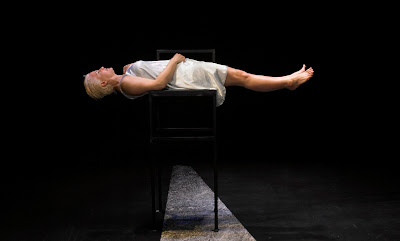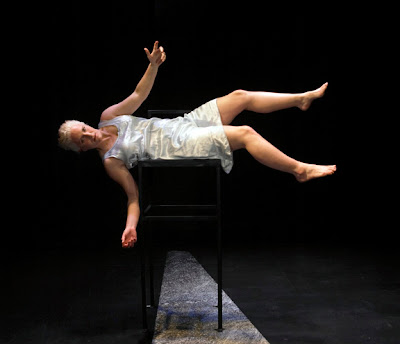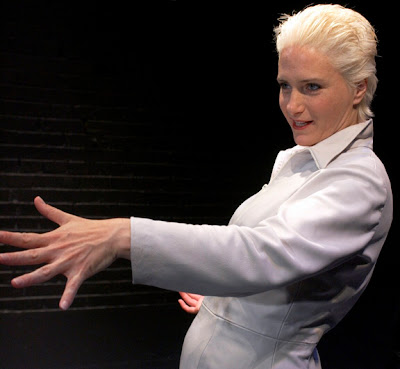1) What the fuck is going on?
Not enough really long games of Monopoly and too much caffeine to make it through the grant applications. Not enough skating and too much driving. BUT some kind of internal explosion of creativity and freeing up of some very old internal ice . . . and some really fantastic snuggly time with my kid.
2) What are some of the differences between your original 2005 production of Poetic License, and your upcoming production of it at the Factory Theatre?
I was really happy with two of the three characters, but one was just not right. She was a hard one . . . an angel is hard to research. Know any? If you, do call me. My amazing composer for this piece didn’t have enough time on the first version – Edgardo Moreno – now we can do it right. AND the through line is story AND poetry . . . Too literal a story doesn’t interest me. I think I got it right now!
 3) What advantages does poetry have over other modes of narration?
3) What advantages does poetry have over other modes of narration?
Levels, layers . . . I love levels. I want my work to exist on many levels. I want the audience to have a rich and complex meal. Story is lovely – but for me – I need the mystical, the organic movement of a tree in the wind – so that the audience can’t go, “Oh, I get it, that’s how it ends. It is about a man who . . . ” I want them to question, get a little lost . . . I want to move closer and closer to something that is NOT just words – but is something that can really only exist on stage, live . . . But is not just movement design or raw emotion. I want it to have an elegant container that grows organically from the content.
4) Why is it important to question the meaning of the word “radical”?
Isn’t it obvious? What is radical anymore? We are desperately in need of radical change and we seem paralyzed. We all now accept global warming . . . but . . .
What does one really do? And that is a least a tangible one. What about the disease of materialism? Economic crisis? Spiritual bankruptcy? AND how do I address these things as an artist . . . truthfully in myself and without sentimentality and yet BRAVELY choose to actually have a point of view.
5) How has Canada’s theatre scene changed since you first started making theatre here in the early 1980s?
I really can’t say . . . I was in such a small and particular part of the scene. I was a kid in Montreal in the 80s, hanging out with the physical theatre crowd at a really exciting time. We all had black eyes from trying to run up walls, we were wearing crash helmets in the studios . . . I was working on this piece where I threw myself into the air talking about throwing myself into the arms of angel Gabriel and I’d come crashing down to the floor . . . we were all showing each other our bruises proudly. It was so self-destructive and fun and young!
I was in these workshops with Richard Pochinko. We then started working on a Timothy Findlay play together for a while and he said . . . come to Toronto, we’ll do this play . . . but he was working so intensely and I wasn’t ready.
At the time, I had no idea what was happening anywhere but in that little exciting community. I was too much of a newbie to work in Montreal and my French was not performance-ready. Carbone 14 and Mime Omnibus, where my friends were all getting work, had just started integrated complex French text. It was either Toronto, or guaranteed paid theatre work with a physical theatre company in the US . . . I went south and got stuck down there.
By the time I was ready to come back . . . I wrote Richard and Ian Wallace sent me a postcard saying he had passed away. I was trying to reach him to ask if he’d help with a play I was doing about dealing with death! I was working with folks with AIDS at the time who were dropping like flies and it was starting to get to me, so he became a character in that play . . . I still miss him . . . I can feel him in this city though!
So how is it different now? Well in my little world – less people are dying in the theatre community, I hope, less bruises and maybe the work is a little less vigorous and urgent but maybe a little healthier all around!
 6) How much of your work is informed by a sense of anger?
6) How much of your work is informed by a sense of anger?
Hmmm, I think that was done several pieces ago. Although sometimes I have to rustle up some righteous indignation to keep me going in the business aspect of the work! But not artistically.
7) What was your favourite part of participating in the 2006 Women Playwrights International Conference in Jakarta?
Wow, there is a whole book in that experience – if anyone wants to make a movie about it – call me . . . I am serious:
- The women I met who had been in prison or exiled for doing theatre to fight genital mutilation or the sex trade or political oppression (one of whom is back in prison in Egypt)!
- The woman hosting the conference who had to introduce the government official hosting the fancy dinner at the town hall who had – a few years earlier – been part of the government who had put her in prison for doing the very play she was now producing at this major festival called The President and the Prostitute. Her eyes still burn inside me; her dignity, anger, passion, self-restraint, courage.
- The young women who followed me around with translators asking me, “How do I find my voice?” My feeling of being completely incapable of answering their question and my new appreciation for the freedom I have as a Canadian woman.
- The moment after I performed when I was standing on stage during the applause while (in a little nightie being watched mostly by women with head coverings) the Canadian Ambassador’s wife came up through the audience to the stage to give me flowers with her eyes a mess with smeared mascara from crying and she stopped on her way to the stage and hugged this Indonesian man in a wheelchair (who I later found out she did not know at all!) I did not really know what was going on. I was told by the SM back stage to stay where I was . . . I felt so naked and raw and overwhelmed . . . and then leaving the stage and being surrounded by female reporters – many in various degrees of Moslem dress, some in contemporary dress, asking me to speak with them.
Suddenly I no longer took for granted my ability to speak freely and the voice that I do have. It has changed my life and reinvigorated my commitment to my work.
 8) What does feminism mean to you?
8) What does feminism mean to you?
Justice. A move away from the use of force towards large and small, practical applications of justice and compassion . . . to learn to see with my own eyes.
Perhaps my experience in Indonesia re-inspired my sense of feminism, as there the overt oppression of women is so tangible. I do feel a responsibility to get my voice out there and to take action in that regard. The recent studies on women in theatre in Canada are certainly depressing and speak to the need for more women to be represented.
I was very inspired by an amazing exhibit I saw in the USA years ago called Independent Spirits: Women Painters of the American West 1890-1945.
Despite this relatively small geographic area and time period, the collection was huge and so impressive. One of the artists was Georgia O’Keefe, and although I am a fan of her work, her work was, for me, not the best in the show. There were countless painters; serious painters I had never heard of. I was in tears by the end, realizing how critical it was for me to take full responsibility for the business of my art and get it out there so that the next generation of men and women would have another female role model that was visible and accessible.
The last time I was at the symphony, the conductor was a woman, as was the first violinist. There was a young girl sitting near me and I thought, “She is going to have a lot more courage than my generation, just from this simple event.”
9) Do you have any unifying theories about the role of formal education in shaping theatre artists?
The old adage, those who can do, do . . . you know the rest . . . is sad. I LOVE the integration of both; and as a teacher I think, teaching and doing should be required. I do not have formal academic education! I learned in studios, on my feet, apprenticing and doing theatre and studying privately with many different people. I have run my own freelance school/studio and taught in so many different kinds of programs . . . there is not one way to train. BUT ONE MUST TRAIN. The dumbing down of the ART FORM of theatre is tragic. Think how long a musician practices daily . . . do actors? THEY MUST. But the allure of TV and film and the fact that hard work and talent are not necessarily related to success in that arena and the financial struggle of surviving in theatre all combine in a negative way to promote – why train?
Well, the art form, the real art form, requires skill and discipline and training. Find a mentor, ask them to advise you in a training program. Ask them . . . what did you do? Then do that. I wrote Don Reider – a brilliant European stage clown – when I was 17 and asked him what to do. He sent me the most amazing letter that I actually used as a manual. (Thanks Don!)
 10) What kinds of stories do North American theatre makers seem to consistently neglect telling?
10) What kinds of stories do North American theatre makers seem to consistently neglect telling?
I am not qualified to say. When my kid grows up, maybe I will see more theatre!
One thing I notice is that we are stuck IN story. I started in the tradition of theatre artists reacting against literary theatre (the representation of The Book). This to me is not just about physical theatre, but about the whole idea of theatre that is not something you can read and not something you can film. I have for the last 10 years entered story and language more fully – but most of my work detours from traditional story structure in some way or another. I love story, but I especially love theatre that is not just story telling.
I find North America gets a little stuck in literal story, whereas Europe (and Montreal) tends to be sitting in a wider vision of theatre. (Which doesn’t necessarily make it better!) I, however, want something visceral, present, not historical representation (although that has its place) and I want an experience of something I can’t really describe with words once I have left the theatre, but that I feel in my gut, or heart or messes with my thinking. Maybe, I want – mature passion about something meaningful beautifully articulated metaphorically . . .
But I bet I am not alone in that (story or not) and I think, the older I get, the more I realize that this is rare and quite hard to attain and one day at a time, little by little, we all do our best to move in that direction.

“there is not one way to train. BUT ONE MUST TRAIN. The dumbing down of the ART FORM of theatre is tragic. Think how long a musician practices daily . . . do actors? THEY MUST. But the allure of TV and film and the fact that hard work and talent are not necessarily related to success in that arena and the financial struggle of surviving in theatre all combine in a negative way to promote – why train?”
i love this, it’s a good synthesis of the major issues making training for the contemporary actor a problem. – if theatre is a craft, then it involves training those skills that make it an art form instead of a personality contest.- we have been struggling with this at praxis. our concerted response begins today as associate artist danny waugh leads many of our company in an audition workshop. other workshops by other artists will follow.
the theory behind this is that each of us is particularly good at something. we could all benefit from a concerted effort to pass our strengths on to one another. maybe we should change it to, those who can, can, because they practice. no, that sucks, but you get what i’m saying.
I can’t imagine what it must have been like to witness the gutting of North American arts communities at the hands of the HIV/AIDS epidemic in the 1980s. Entire theatre companies were blinked out of existence – as were countless painters, arts administrators, musicians, designers, patrons – destroyed by a terrible wasting disease.
Thank you Erika for reminding me to never forget the art makers I’ll never know.
regarding the first comment-
I am always encouraging theatre groups and even my grad students at York to share the cost of space rental and teach each other… we did that in Montreal… and had a blast- and the more mixed up the group the better. Too often we feel we need to be making a piece of theatre to get together and share/play…